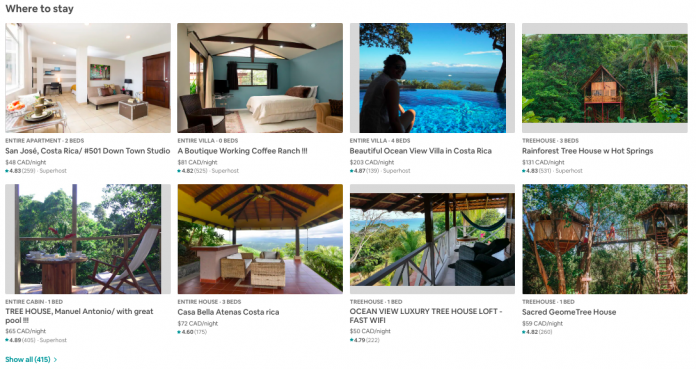
New regulation law looms over Costa Rica’s short-term rental market
Government puts the squeeze on online rentals
In an alleged effort to protect tourists from exploitation by unregulated vacation rental landlords, the government is imposing tighter restrictions on non-traditional accommodations and putting a squeeze on the digital platforms that facilitate them such short-term rentals.
In late August, Costa Rica’s Legislative Assembly approved Framework Law No. 20.865 for the regulation of non-traditional hosting and its intermediation through digital platforms such as Airbnb, VRBO, Homeaway, and others.
The regulations and tax increase will make hosting more rigorous and expensive. Factors that will inevitably pass on to the end-user, the tenant.
Critics claim the move is intended to discourage small-scale, mom and pop-type rooms and home rentals in support of the country’s hospitality industry. By making the enterprise more expensive and applying additional bureaucratic and technical hoops to jump through, many informal landlords could look elsewhere for work.
María Amalia Revelo, Minister of Tourism, said the bill, when passed, will create a more balanced market within the tourism sector between traditional hotels and platforms such as Airbnb.

“This law will allow equal competition within the tourism sector among the lodging companies and guarantees an avant-garde step in terms of regulations to ensure greater protection for tourists.”
In October 2016, Central American Data reported that the number of Airbnb rental accommodations in Costa Rica represented an equivalent of 18% of the hotels in the country. Some 11,000 homes on Airbnb alone were accounted for, not including other online platforms like HomeAway, VRBO, and Facebook.
In 2018, as the sector flourished, Airbnb facilitated lodging for more than 520,000 guests in Costa Rica. Equal to an estimated 9.2% of the tourists that entered Costa Rica by air, according to the Costa Rica Board of Tourism (ICT).
Airbnb reported that as a result of the new regulations it anticipates a considerable drop in the number of accommodations in the country.
“… a possible sharp fall of its hosts in Costa Rica is expected, in view of the obligations of the new law that regulates non-traditional accommodation in the country. Additional expenses are required, such as hiring lawyers and accountants, as well as the adequacy of accommodation sites, which would cause this desertion of affiliates,” explained Airbnb Director of Public Policies and Communications for the Caribbean and Central America to Nacion.com.
Advertisement
Among the requirements the bill proposes for non-traditional hosting companies and individual owners that have not been reporting or collecting taxes before, are to register with the Costa Rica Board of Tourism (ICT), payment of the 13% VAT (Value Added Tax), and filing with the Ministry of Finance.
Garland M. Baker of Costa Rica Expertise, states that the new law will also require non-traditional landlords to comply with Costa Rica’s electronic invoicing system and adhere to Equal Opportunity Law 7600 that ensure rentals are wheelchair accessible and up-to-code for individuals with physical limitations.
Once signed, the law will go into effect when it is published in the official government newspaper, La Gaceta.
The following timeframe published by AM Costa Rica’s G.M. Baker details compliance deadlines for landlords once the law takes effect.
- Registration with ICT: One year to comply once the law is active.
- Registration with the Ministry of Finance tax department: Immediately once the law is active.
- Electronic invoicing and collection of 13% VAT: Immediately once the law is active. (including monthly remittance of the tax to the government)
- Adhere to Law 7600 Equal Opportunities for Persons With Disabilities: Two years to comply once the law is active.








